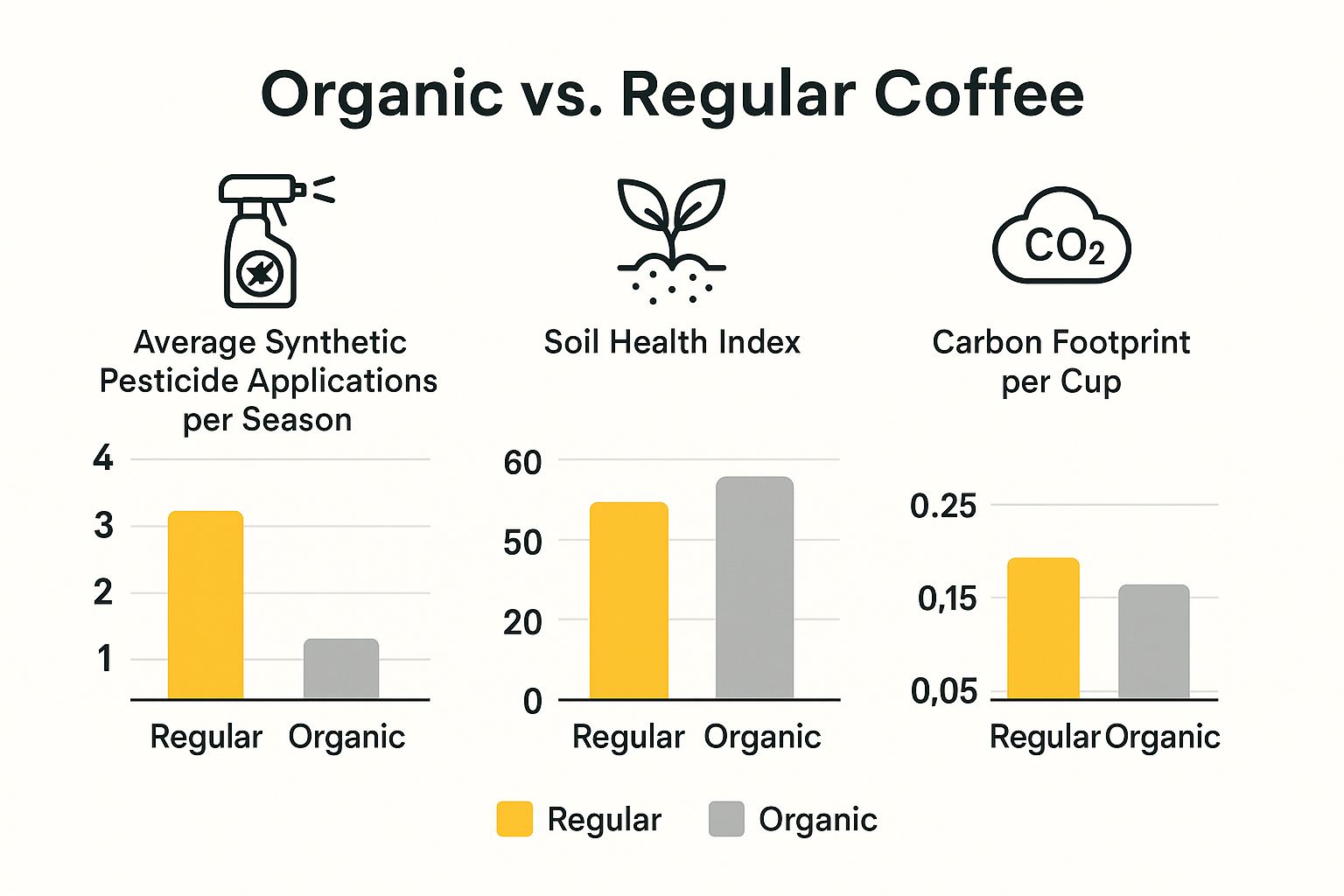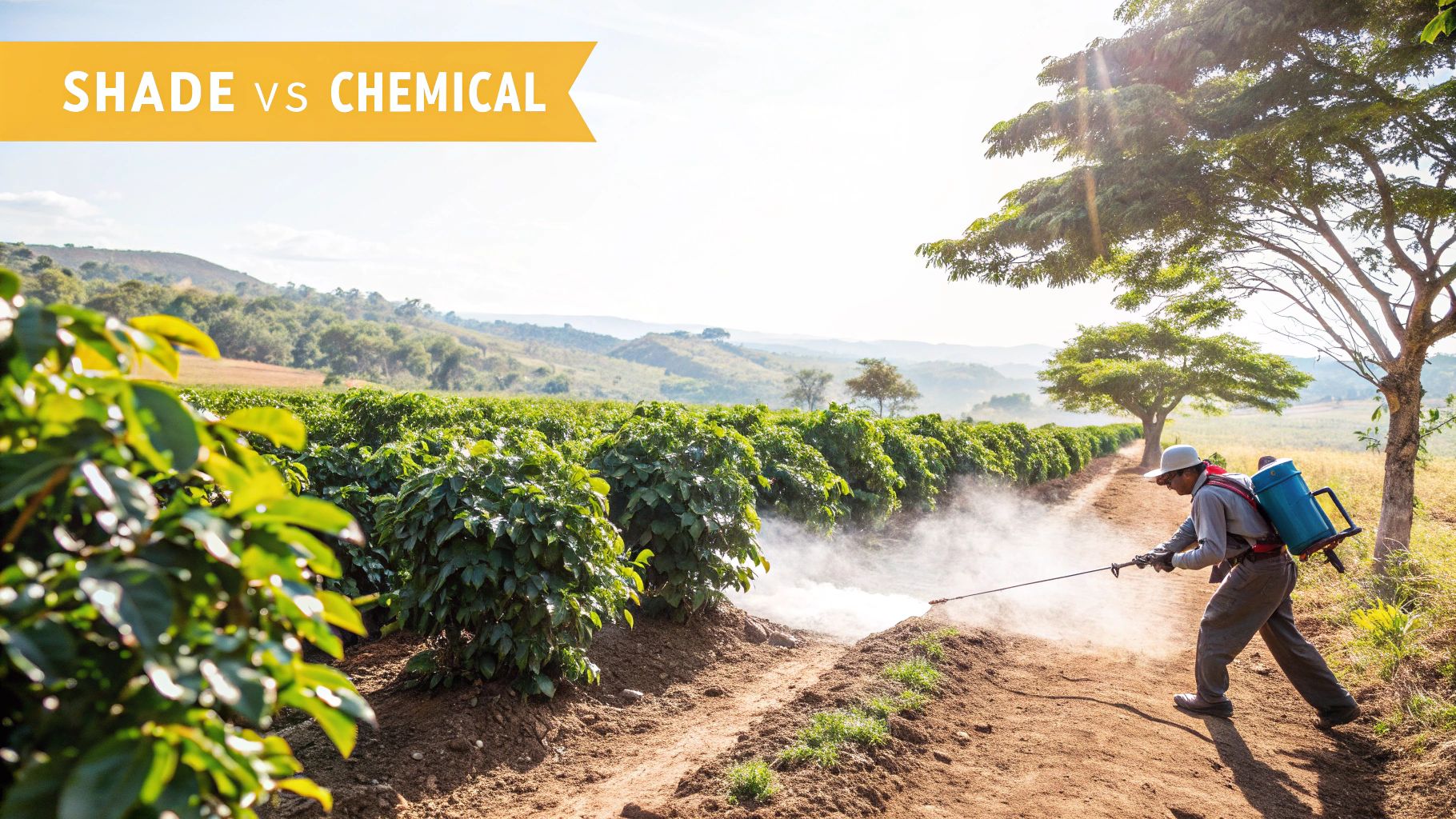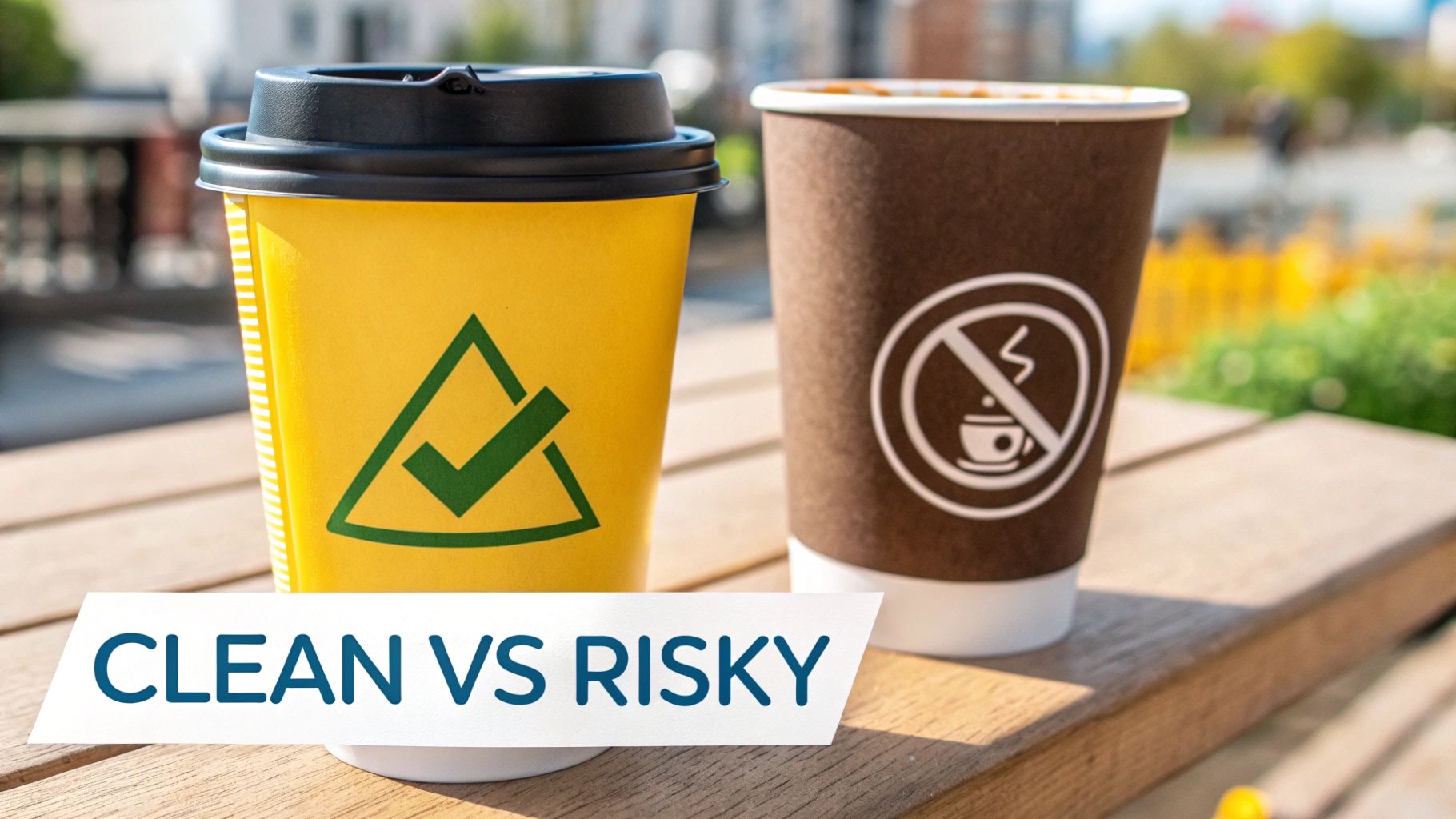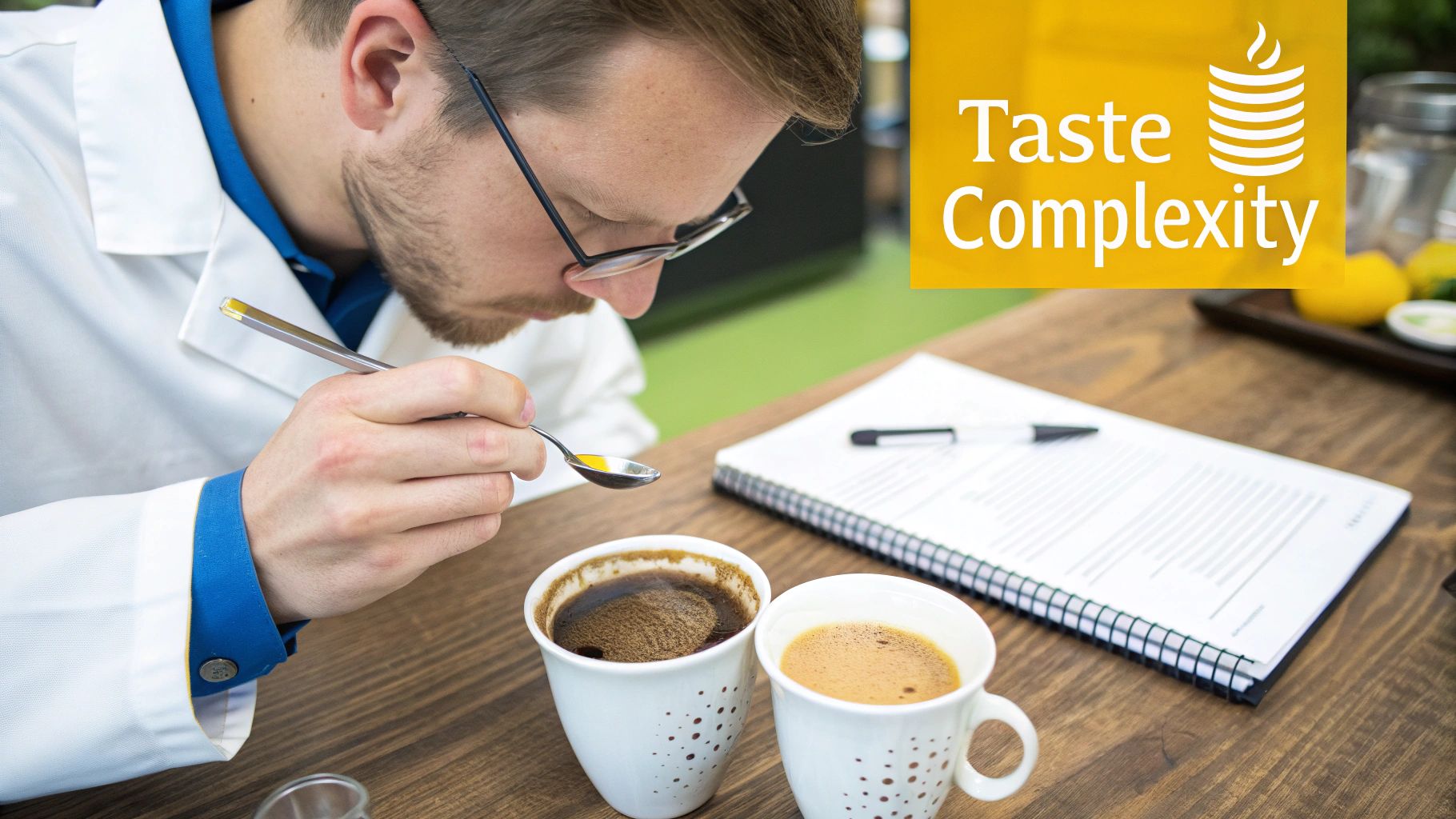At its heart, the debate between organic and regular coffee boils down to how the beans are grown. Organic coffee is cultivated without synthetic pesticides and chemical fertilizers, with farmers instead using natural methods like composting to enrich the soil. On the other hand, conventional coffee farming often relies on these chemicals to boost crop yields, which has a ripple effect on the environment, your health, and even your wallet.
What Really Separates Organic and Regular Coffee
When you're standing in the coffee aisle, you’re not just choosing a flavor profile; you're choosing between two entirely different agricultural philosophies. The production of regular coffee is typically geared toward maximizing output, plain and simple. This usually involves synthetic fertilizers to supercharge growth and pesticides to ward off pests, but these practices can have serious consequences down the line.
Organic coffee farming operates under a much stricter set of rules, often certified by bodies like the USDA. These guidelines completely forbid the use of synthetic chemicals. Instead, farmers have to get creative, using time-tested natural techniques to grow their crops.
This really comes down to a few key areas:
- Farming Methods: Organic farms build healthy soil using natural fertilizers like coffee pulp and compost. They also rely on the local ecosystem for pest control. Conventional farms often turn to chemical fertilizers and synthetic pesticides as their primary tools.
- Environmental Impact: Organic practices are all about long-term sustainability—promoting soil health, protecting water sources from chemical runoff, and encouraging biodiversity. In contrast, conventional methods can contribute to soil erosion and water contamination.
- Health Considerations: When you sip organic coffee, you can be confident you're not consuming residual synthetic pesticides. It’s a cleaner cup, from farm to mug.
This infographic breaks down the major differences in pesticide use, soil health, and the overall carbon footprint between the two.

The numbers don't lie. Organic farming means zero synthetic pesticide applications and actively contributes to healthier, more resilient soil. While there’s a place for both types of coffee on the market, understanding these foundational differences is crucial for making a choice that feels right for you.
For a quick side-by-side look, this table breaks down the essentials.
Key Differences Organic vs Regular Coffee
| Attribute | Organic Coffee | Regular Coffee |
|---|---|---|
| Pesticide Use | Prohibited; natural pest control only | Synthetic pesticides are commonly used |
| Fertilizers | Natural compost, manure, coffee pulp | Synthetic, chemical-based fertilizers |
| Soil Health | Focused on building rich, fertile soil | Can lead to nutrient depletion and erosion |
| Biodiversity | Often shade-grown, creating wildlife habitats | Often sun-grown on cleared land |
| Certification | Requires strict third-party verification | No specific growing standards required |
As you can see, the divergence starts at the very beginning of the supply chain—in the soil itself. These differences ultimately influence everything from taste to environmental impact.
Farming Practices and Environmental Footprint

The journey a coffee bean takes from the farm to your cup leaves a mark on the planet, and how it's grown makes all the difference. This is where the contrast between organic and regular coffee becomes incredibly stark. Conventional coffee farming often chases high yields, using intensive methods that can have serious environmental consequences.
This high-volume approach usually means clearing large swaths of land to create sun-drenched monoculture fields. While this "sun-grown" method cranks up production, it comes at the cost of the natural forest canopy. The resulting deforestation destroys crucial habitats for birds and other wildlife, throwing the local ecosystem completely out of balance.
On top of that, conventional farms lean heavily on synthetic fertilizers and pesticides. Over time, these chemicals strip the soil of its health, leading to erosion and nutrient loss. When it rains, the runoff carries these chemicals into local water sources, contaminating rivers and groundwater that entire communities rely on.
A Sustainable Approach to Coffee Cultivation
Organic coffee farming is built on a completely different philosophy—one that sees the farm as part of a larger ecosystem. The cornerstone of this approach is shade-grown coffee, where the coffee plants thrive under the protective canopy of native trees. This method keeps the natural forest intact, creating a vibrant, living habitat for local wildlife.
The ecological benefits of these forested farms are huge:
- Boosts Biodiversity: They become sanctuaries for birds, insects, and other animals that double as natural pest controllers.
- Builds Healthy Soil: The leaf litter from the canopy acts as a natural mulch, enriching the soil without any need for synthetic fertilizers.
- Protects Water: The forest cover prevents soil erosion and helps the ground retain moisture, which keeps local watersheds clean and healthy.
A well-managed, shade-grown organic coffee farm isn't just a farm; it's a functioning ecosystem. Some can support up to 150 species of birds, rivaling the biodiversity of a native forest. It’s a direct solution to the habitat destruction caused by conventional sun-grown coffee.
This focus on ecology is about long-term sustainability. By cultivating a healthy, resilient environment, organic farmers don't just produce amazing coffee; they also help sequester more carbon in the soil, making them an active part of the fight against climate change.
Making an Informed Choice
The environmental impact of your coffee is a direct result of the choices made on the farm. When you choose organic, you're backing farming practices that prioritize biodiversity, protect clean water, and build healthy soil for the future.
This commitment to the environment often goes hand-in-hand with ethical practices. To see how these methods also support farming communities, it’s worth understanding what fair trade coffee is and how it helps ensure farmers get paid fairly for their hard work.
Ultimately, the difference in farming methods presents a clear choice. Regular coffee might deliver on quantity, but organic coffee provides a blueprint for sustainable agriculture that benefits the planet and its people. Your daily cup can be a small but powerful vote for a healthier world.
Evaluating Health Impacts and Potential Risks

When we get into the organic coffee vs regular coffee discussion, health is almost always the first thing people bring up. It makes sense. What you’re putting into your body every single morning matters, and the biggest health difference here really boils down to what’s left on the bean: synthetic chemical residues.
It’s no secret that conventional coffee is one of the most chemically treated crops grown today. To boost yields and fight off pests, farmers often rely on a whole arsenal of synthetic pesticides, herbicides, and fertilizers. While the high heat of roasting does a decent job of burning off many of these chemicals, it’s not a perfect process. Trace amounts can, and often do, make it into your morning brew.
This is where certified organic coffee offers a clear alternative. Organic farming standards are incredibly strict—they outright ban the use of synthetic chemicals. This simple fact means you're starting with a cleaner bean from the moment it’s picked. For anyone trying to consciously lower their chemical load, this is a huge plus.
Antioxidants and Nutrient Density
Beyond just avoiding chemicals, there's a lot of chatter about whether organic coffee packs more of a nutritional punch. Coffee is naturally loaded with antioxidants, which are fantastic for helping protect your body from cellular damage. Some studies suggest that coffee plants grown in healthier, nutrient-rich organic soil can produce beans with a higher concentration of these good-for-you compounds, like polyphenols.
The thinking behind this is pretty straightforward. Healthy soil, free from synthetic inputs, allows the coffee plant to absorb more of the natural nutrients it needs to thrive. This can lead to a more nutrient-dense bean. So, while both regular and organic coffee offer health benefits, the organic version delivers them without the baggage of chemical residues.
The core health benefit of organic coffee is clear: it significantly reduces your exposure to synthetic pesticide residues. This simple choice helps ensure your daily ritual is as clean and natural as possible, supporting overall wellness.
Many coffee drinkers I talk to feel this is the most compelling reason to go organic. By prohibiting synthetic fertilizers and pesticides, organic production minimizes potential health risks from chemical exposure.
Making a Health-Conscious Decision
At the end of the day, the right choice really depends on your personal health priorities. The debate over the long-term risk from pesticide residues in conventional coffee is still ongoing, but choosing organic offers something much simpler: peace of mind. You get a guarantee that your coffee was grown without any synthetic chemical inputs. Period.
For many health-conscious people, that assurance is the deciding factor. If your goal is to eat and drink things in their most natural state, organic coffee just makes sense.
By making the switch, you’re not just getting a great cup of coffee; you’re making an active choice for a cleaner product. To explore this further, you can learn more about the benefits of drinking organic coffee in our detailed guide. It’s a small change that can align your daily coffee habit with a bigger commitment to personal wellness.
The Global Market and Price Drivers
To really get why there's a price gap between organic coffee vs regular coffee, you have to look at the big picture: the massive global market. The conventional coffee industry is an absolute giant, built for volume and speed. Its pricing is hitched to the rollercoaster of the global commodities market, where things like a sudden frost in Brazil, political shifts, or supply chain hiccups can send prices soaring or plummeting overnight.
Regular coffee gets a huge boost from economies of scale. Think vast, sun-drenched plantations churning out incredible amounts of beans. This scale helps keep the price you pay at the store relatively low. But that price tag doesn't tell the whole story; it often hides the environmental and social costs of that efficiency.
The Economics of Organic Coffee
The organic coffee world operates on a different set of rules. It's a smaller market, but it's growing fast, fueled by people who care more about health and where their food comes from. The global organic coffee market was valued at about USD 8.66 billion in 2024 and is expected to nearly double to USD 16.51 billion by 2032. That's not just a trend; it's a major shift in what consumers are demanding. For a deeper dive into these numbers, check out the full organic coffee market research.
So, what's behind the higher price of an organic bag of beans? It boils down to a few key things:
- Certification Costs: Getting that "USDA Organic" seal isn't free. It's a pricey, multi-year process with tons of paperwork and strict inspections.
- Labor-Intensive Farming: Without chemical shortcuts, farmers rely on more hands-on methods like composting and natural pest control. That means more work and more people.
- Lower Yields: Organic, shade-grown coffee farms often produce fewer beans per acre than their sun-grown counterparts. Quality over quantity has a cost.
- Ethical Labor Practices: Many organic farms also pursue Fair Trade certification, which guarantees farmers a stable, living wage for their hard work.
Ultimately, the price of organic coffee reflects its true cost. The extra dollar or two you pay is an investment in healthy soil, thriving ecosystems, clean water, and fair wages for the people who grow your morning cup.
This economic split gives us a clear choice. Regular coffee's price is dictated by a massive commodity system focused on pure volume. Organic coffee's price, on the other hand, is shaped by the meticulous standards of certification, ethical production, and the real-world costs of farming in a way that’s good for the planet. When you choose organic, you’re not just buying coffee—you’re investing in a completely different supply chain.
A Nuanced Look at Flavor and Taste Profiles

So, does organic coffee actually taste better? It’s the million-dollar question. While plenty of coffee lovers will swear it does, the real answer in the organic coffee vs regular coffee debate is a bit more complicated. The taste of coffee is a long story, and its organic certification is just one chapter.
The argument for organic coffee's superior flavor starts with the soil. Healthy, organically managed soil is teeming with the natural nutrients a coffee plant craves. This environment helps the coffee cherry ripen slowly and develop a more vibrant, complex flavor profile. It's a lot like growing tomatoes—the one from your nutrient-rich garden will almost always taste sweeter than one from a depleted pot.
Key Factors Shaping Your Coffee’s Taste
But here’s the thing: an organic label isn't a golden ticket to a better-tasting cup. A handful of other factors arguably have a much bigger say in what you actually experience. Knowing what they are is the real secret to finding a coffee you love, whether it's organic or not.
These are the primary drivers of flavor:
- Bean Origin: A coffee from the volcanic slopes of Guatemala will taste completely different from one grown at high altitudes in Ethiopia. The terroir—the land, climate, and elevation—is everything.
- Roast Level: A light roast lets the bean’s bright, fruity, and acidic notes shine. Take it to a dark roast, and you’ll unlock those deep, chocolaty, and smoky flavors.
- Brewing Technique: How you brew matters. A French press gives you a bold, full-bodied cup, while a pour-over highlights clarity and nuance. Each method tells a different story with the same beans.
The "organic" label tells you how a coffee was grown, not how it will taste. While healthier soil can create a higher-quality bean, the origin, processing, and roast level often have a more pronounced effect on the final flavor.
Let's put it this way: a shade-grown organic Guatemalan bean might taste cleaner and brighter than its sun-grown conventional neighbor. But a badly roasted organic bean will always lose to a perfectly roasted conventional one.
Think of the organic certification as one indicator of quality among many, not the final word.
How to Choose the Right Coffee for You
So, how do you decide between organic coffee vs regular coffee? It really boils down to what you value most. There’s no universal right answer, but once you pinpoint your priorities, the choice becomes a lot easier.
The goal isn't perfection; it's about making an informed decision. By understanding the key differences, you can find a coffee that fits your budget, health goals, and taste buds.
Making the Call Based on What Matters to You
Let's simplify things by looking at a few common scenarios. See which one sounds most like you, and you'll have a clear recommendation.
-
You're a Daily Drinker on a Budget: If keeping costs down is your main goal, conventional coffee is hard to beat on price. But that doesn't mean you're stuck with bad coffee. Look for roasters who are open about where their beans come from, even if they lack the organic seal. You can often find a great-tasting, ethically sourced coffee without breaking the bank.
-
You're Focused on Health and the Planet: For anyone wanting to avoid synthetic chemicals and support eco-friendly agriculture, certified organic is the way to go. That USDA Organic seal is your assurance that the coffee was grown without synthetic pesticides and fertilizers, promoting healthier soil and protecting biodiversity.
Every cup you buy is a vote for a certain kind of farming. Choosing organic means you're investing in farms committed to long-term ecological balance—think cleaner water, healthier soil, and more wildlife.
- You're All About the Flavor: If your top priority is an exceptional, nuanced cup of coffee, then you should be exploring single-origin beans from high-quality roasters. While many of the most incredible coffees happen to be organic, factors like the origin, processing method, and roast level often have the biggest impact on taste. The good news? You can have it all by exploring single-origin organic options.
At the end of the day, the right coffee is the one you look forward to drinking. If you're ready to dive into some truly fantastic options, our roundup of the best organic coffee brands is the perfect place to start.
Got Questions? We've Got Answers
When you start digging into the coffee world, it's easy to get tangled up in the details, especially when comparing organic and regular beans. Let's clear up some of the most common questions so you can feel confident about what's in your cup.
Is Organic Coffee Really Worth the Higher Price?
Honestly, whether the premium for organic coffee is "worth it" comes down to your personal priorities. That higher price tag isn't just for show; it's a reflection of what it takes to produce coffee in a more thoughtful, sustainable way. Think certification fees, more hands-on farming without chemical aids, and often, a fairer wage for the people growing the beans.
If you're someone who wants to limit your exposure to synthetic pesticides, support farming that’s kinder to the planet, and know your money is backing better labor practices, then yes—the extra cost is a direct investment in those values. You're paying for a cleaner product and a healthier ecosystem.
Can You Actually Taste a Difference?
This is the big one, isn't it? While organic farming can absolutely lead to a higher-quality bean with a cleaner, more complex flavor, it's not the only thing that shapes the taste. The coffee's origin, how the beans are processed, and the roast profile usually play a much bigger role in what you experience in the cup.
A seasoned coffee pro might be able to pinpoint those subtle, lively notes from beans grown in rich, organic soil. For most of us enjoying our morning brew, though, the taste difference between organic vs. regular coffee might not be the most obvious thing.
Your best bet for a better-tasting cup almost always comes down to freshness and good brewing technique. A masterfully roasted conventional coffee will taste worlds better than a stale or poorly brewed organic one. The certification is just one piece of the quality puzzle.
How Do I Know My Coffee Is Genuinely Organic?
The simplest, most trustworthy method is to look for an official certification seal right on the bag. Here in the United States, the gold standard is the USDA Organic seal. Other countries have their own official seals and regulatory bodies.
These seals aren't just marketing fluff; they are legally protected and guarantee the coffee was grown and processed under strict government rules. This is your assurance that the beans are free from prohibited synthetic pesticides, herbicides, and fertilizers. Without that seal, any "organic" claim is just words on a package.
At Cartograph Coffee, we think your daily cup should be exceptional without being complicated. Our organic instant coffee brings together amazing flavor and on-the-go convenience. Explore our collection and elevate your coffee experience.